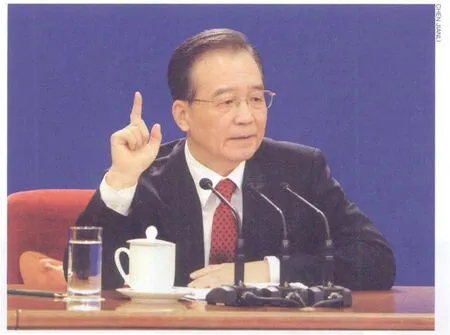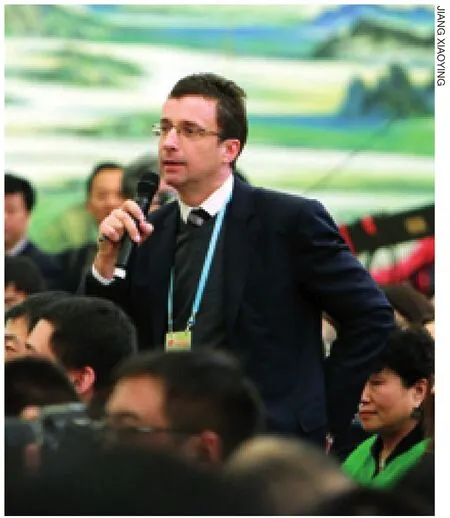PREMIER MEETS THE PRESS
2010-03-15
On March 14, Premier Wen Jiabao addressed the Chinese and foreign media at a press conference after the closing meeting of the Third Session of the 11th National People’s Congress. Edited highlights on a number of economic and social issues follow∶

CHINA’S VOICE: Premier Wen tells the press conference on March 14 that the stable renminbi has played an important role in helping the world economy recover from the worst financial crisis in decades
Renminbi stability
The renminbi has remained all but stable and has not been undervalued—a development best explained by examining trade fi gures.
Among China’s 37 major trade partners,16 saw an increase in exports to China last year. The European Union, with its total exports plummeting 20.3 percent, reported a 15.3-percent decline in exports to China.Germany, for example, witnessed its Chinabound exports hit a record high of 76 billion euros last year. Meanwhile, exports of the United States plunged a hefty 17 percent in 2009, far sharper than a 0.22-percent drop in its exports to China.
China has become a major market for exports from its neighboring countries, including Japan and the Republic of Korea, as well as Europe and the United States.
The stable renminbi has also played an important role in helping the world economy recover from the worst fi nancial crisis in decades.
Since July 2005 when China began its currency reform to unpeg the renminbi against the U.S. dollar, the renminbi has appreciated 21 percent against the U.S. dollar,or 16 percent in real terms. But from July 2008 to February 2009, the most trying time for the global economy, the renminbi did not lose its value, but appreciated in real terms by 14.5 percent. During this period,China’s exports sank 16 percent but imports only dropped 11 percent, resulting in a $102-billion decrease in trade surplus.
A country’s exchange rate depends on its national economy and economic situation. China stands for free trade as it not only keeps economy fl owing, but also brings harmony and peace to the people. Also, China opposes accusations and even forceful measures that press the renminbi to appreciate,which will impede the exchange rate reform.
Finally, China will further improve the renminbi exchange rate formation mechanism and keep the rate basically stable at a reasonable and balanced level.
Financial situation
Despite some signs of recovery, dark times lay ahead for the world economy.Acute unemployment still plagues many major economic powers, while sovereign debt risks, not to mention volatile commodity prices and exchange rates of major currencies, stand to bring other countries to their knees. Meanwhile, in fl ationary expectations are proliferating in many countries, leaving policymakers with the predicament of determining an appropriate time to cease their massive stimulus plans.
Without a vibrant world economy, China cannot sustain recovery on its own. Many Chinese enterprises, for instance, have yet to experience a substantial turnaround and still rely heavily on government support.
The international fi nancial crisis came as a heavy blow to the Chinese economy. But it was also a powerful catalyst to adjust the economic structure and seek more sustainable growth. This will be a long-term process and deserves arduous efforts.
This year China needs to strike a balance between maintaining fast and steady development, economic rebalancing and managing inflation expectations to avert a possible economic “double dip.”
Macroeconomic policies
Current monetary policies aim to ensure fl uid currency liquidity, keep interest rates at a reasonable level and manage inflationary expectations.
Great importance will be attached to agriculture—the lifeline of the economy. This sector also plays a decisive role in ensuring economic growth and managing inflation expectations.
The country will also maintain a consistent and stable macro-economic policy. In other words, China will stick to the proactive fiscal policy and the moderately easy monetary policy to underpin the hard-won economic recovery. The government will keep its policies flexible and in line with changing economic situations.
Growing forex, growing concerns
China has an enormous amount of foreign exchange reserves and needs to protect and take advantage of these assets.
It is necessary to guarantee the “safety,liquidity and positive value” of the assets through diversi fi ed investments. That is why the country has purchased a number of foreign debts, mostly in U.S. treasuries.
But now instability of the U.S. dollar has become a great concern for the safety of these investments and China cannot afford any mistakes in the management of the national fi nancial assets. The U.S. Government should also take action to assure foreign investors of its treasury bonds, an act that will be bene ficial to both the United States and its investors.
Trade freedom
China fi rmly supports free trade, which will not only promote world economic growth, but also improve people’s livelihoods.
Moves by some countries to shore up exports are understandable, but it is still irrational to devalue currencies to stimulate exports while at the same time pushing for currency appreciation of other countries.This is obviously trade protectionism.
As the side effects of the fi nancial crisis take hold, trade protectionism is increasing instead of abating, a development that deserves attention from all nations.
As proof of its support to global trade, China sent purchasing groups to the European Union and the United States last year and will also launch new measures this year to increase imports.
In addition, China will double its efforts to make balanced international payments and propel free trade, a driving force for the global economic recovery.
At present, the most important task is to push forward the Doha round talks and create a fair and balanced trade environment.The United States and EU should recognize China’s status as a market economy and lift bans on hi-tech exports to China.
Processing trade accounts for half of China’s massive trade volume, and exports from foreign businesses in China and Chinese-foreign joint ventures in China account for 60 percent. So any country that imposes restriction on China will eventually hurt its own business.
Cross-Straits benefits
The Chinese mainland and Taiwan have committed large amounts of time and resources to the Economic Cooperation Framework Agreement (ECFA), a comprehensive pact that will benefit both sides of the Straits. The pact will be based on three principles∶ equal negotiation, mutual bene fi ts and consideration for each other.
The agreement should also take into account the different economic and market situations of both sides, and tend to the interests of Taiwan’s small and medium-sized enterprises and the people, particularly the farmers. Tariff breaks are one of the concessions the mainland can make to benefit Taiwan and its farmers.
Signing the ECFA will be a complex process, but problems will eventually be resolved since the mainland and Taiwan are brothers.
Hong Kong’s future
Numerous options exist to allow Hong Kong to maintain its economic vitality and accelerate development.
First, make persistent efforts to develop Hong Kong into an international financial,shipping and trade center.
Second, press ahead with its advantageous industries—the service sector in particular.

INVESTMENT DESTINATION: A reporter from The Wall Street Journal asks Premier Wen about the investment environment in China at the press conference on March 14 at the Great Hall of the People

DIPLOMATIC STANCE: A reporter from the German Press Agency raises a question about China’s diplomatic principles

JOINING HANDS: A reporter from the Taiwan-based United Daily News asks about economic cooperation across the Taiwan Straits

STABLE YUAN: A reporter from the Financial Times asks Premier Wen about China’s stance on the renminbi exchange rate

SINO-U.S. TIES: A reporter with the Agence France Presse asks about Sino-U.S. relations
Third, strengthen Hong Kong’s economic links with the Pearl River Delta and tap into the mainland’s vast markets. The economic boom on the mainland provides great potential for Hong Kong’s expansion.
Fourth, Hong Kong residents should make concerted efforts to sustain stability and prosperity in the city. In addition to economic growth, Hong Kong will also gradually develop political democracy in accordance with the Basic Law.
Fifth, it is also imperative for the special administrative region to improve the livelihood of its people and take great strides to improve the educational system.
In crafting its 12th Five-Year Plan, the Central Government will also take into consideration Hong Kong’s economy and canvass opinions from local residents.
Climate change
Reports have circulated that China was“arrogant” after refusing to attend a key meeting prior to the Copenhagen climate change summit late last year. It is necessary to clarify the circumstances surrounding that situation.
On December 17, 2009, at a banquet hosted by the Danish Queen, a European leader informed the Chinese delegation that China was on the list of participating countries for a meeting that would be held later that evening. The Chinese delegation was shocked, and immediately checked and confirmed that no notification had been received. Despite this, the delegation still decided to send Vice Foreign Minister He Yafei to the meeting on behalf of the Chinese delegation.
So why was China not invited to the meeting? The question remains unanswered.
At the actual summit, the Chinese delegation made arduous efforts to help reach an agreement on climate issues. At the end of January this year, after the Copenhagen conference, in respective letters to the United Nations Secretary-General Ban Ki-moon and Danish Prime Minister Lars Loekke Rasmussen, China expressed its support for the Copenhagen Accord.
So why do some people persist in pointing fi ngers at China?
The issue of climate change concerns the survival of all human beings, the interests of all countries, and equity and justice in the international community. So China is justifi ed to stick to the principle of “common but differentiated responsibilities,” and will also work with other countries to advance global efforts in addressing climate change.
Peaceful development
In recent foreign media reports, China has been described as being full of selfcon fi dence, or even arrogance. But that is not how China thinks of itself.
First, though the Chinese economy saw a rapid growth in recent years, the country still has problems to solve, such as uneven development between urban and rural areas and between different regions, a large population and a weak economic foundation. In general,the country is still at the primary stage of development.
Cities like Beijing and Shanghai cannot represent the whole of China. Strenuous efforts still have to be made to build a society that is better off in all aspects. The country will have to wait till the middle of this century to become a medium-level developed country, and it might take a hundred years or more before modernization can be realized.
Second, China has always adhered to the path of peaceful development, and its development will not affect any other country.China has never sought hegemony in the past and will never do so as a developed country in the future.
Third, China has always been steadfast in safeguarding its sovereignty and territorial integrity, even when it was still poor.
Fourth, China is a responsible country and has played an active role in international cooperation and in the handling of major global economic and political issues. Its aid to other developing countries has always been unconditional. ■
